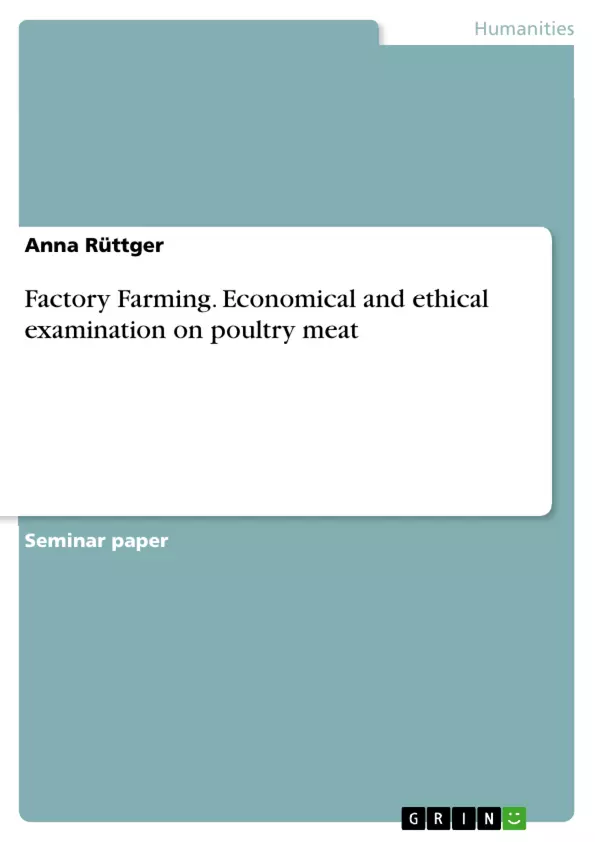The paper will give answers to different issues and analyse these throughout. For example it will introduce the topic with the question why factory farming has occupied such an important significance within today’s society and whether this way of production can effectively satisfy the needs of the society. The essence of this paper is the ethical aspect of factory farming.
The most important questions raised will be if such an amount of animals has to die in order that human race is feeding better, and whether the welfare of humanity can ethically justify the suffering of animals. The document is divided into two parts. The first section will explain the term factory farming and deal with the economic component of it. The second part will refer to the ethical aspect of killing massive numbers of animals. It will give an insight into ethical perspectives and analyse the theme of the first part with the help of the ethical view. In this way it is tried to give a complete overview on the subject regarding business ethics in the range of animal husbandry.
Due to increasing prosperity, the requirement for eating meat is rising steadily and today meat consumption is a firmly established component of nourishment in western countries and, increasingly, in developing and emerging countries. Consumption in Japan, for example, has increased more than six fold since 1960. Further, the increase in China is higher than 15 times. The divisive factor is that the consumption of beef, for example, has decreased almost worldwide, while the consumption of chicken has increased noticeable. The USA represents this fact very prominently, as the consumption of beef decreased by 20 per cent between 1975 and 2010, whilst the chicken consumption has tripled. The turning point was in 1990, when there was more chicken consumption than beef consumption for the first time. Considering that this trend can not only be noticed in the USA, but rather worldwide, this document will focus on the meat production of the so-called chickens for fattening and examine the economic and ethical benefit in more detail.
Inhaltsverzeichnis (Table of Contents)
- Introduction
- 1 Factory Farming from an Economic Point of View
- 1.1 Facts and Economical Benefit
- 1.2 Consequences of Factory Farming
- 2 Factory Farming from an Ethical Point of View
- 2.1 Handling of Chickens for Fattening within the Factory
- 2.2 Utilitarian Point of View
- 3 Conclusion
Zielsetzung und Themenschwerpunkte (Objectives and Key Themes)
This seminar paper aims to analyze the economic and ethical aspects of factory farming, specifically focusing on the production of poultry meat. It examines the reasons behind the growing demand for meat and the role factory farming plays in meeting this demand. Furthermore, the paper investigates the ethical implications of intensive animal production, including the welfare and suffering of animals.
- Economic benefits and consequences of factory farming
- Ethical considerations related to animal welfare in factory farming
- The impact of factory farming on consumer demand and meat consumption patterns
- The role of ethical perspectives, such as utilitarianism, in evaluating factory farming practices
- The potential for sustainable and ethical alternatives to factory farming
Zusammenfassung der Kapitel (Chapter Summaries)
- Introduction: This chapter introduces the topic of factory farming, highlighting the growing demand for meat, particularly poultry, and its impact on modern society. It emphasizes the economic and ethical considerations surrounding this practice, setting the stage for further analysis.
- 1 Factory Farming from an Economic Point of View: This chapter examines the economic aspects of factory farming, including the rationale behind its adoption and its impact on meat production. It analyzes the benefits of this system, such as increased efficiency and reduced costs, but also explores its potential economic consequences, such as environmental damage and dependence on industrial agriculture.
- 2 Factory Farming from an Ethical Point of View: This chapter delves into the ethical considerations surrounding factory farming. It explores the treatment of animals within these systems and the potential impact on their welfare. The chapter also examines ethical perspectives, such as utilitarianism, which can be used to evaluate the morality of factory farming practices.
Schlüsselwörter (Keywords)
Factory farming, poultry meat, animal welfare, economic benefits, ethical considerations, utilitarianism, intensive agriculture, industrial production, meat consumption, sustainability.
Frequently Asked Questions
What is the main focus of this paper on factory farming?
The paper provides an economic and ethical examination of factory farming, with a specific focus on poultry meat production and animal welfare.
Why has poultry consumption increased so significantly compared to beef?
Due to increasing global prosperity, meat consumption has risen. While beef consumption has decreased in many places, chicken consumption has tripled in countries like the USA since 1975, primarily due to economic efficiency and changing dietary habits.
What are the economic benefits and consequences of factory farming?
The economic benefits include increased production efficiency and reduced costs. However, consequences include environmental damage and a heavy dependence on industrial agricultural systems.
How does the paper address the ethical aspect of animal suffering?
The paper uses ethical perspectives, such as utilitarianism, to analyze whether the welfare of humanity can justify the massive suffering and killing of animals in factory farming.
What role does business ethics play in animal husbandry?
The document seeks to provide a complete overview of business ethics by evaluating the trade-offs between economic profit and the moral responsibility toward animal welfare.
- Citar trabajo
- Anna Rüttger (Autor), 2016, Factory Farming. Economical and ethical examination on poultry meat, Múnich, GRIN Verlag, https://www.grin.com/document/374939



